1976 CHEVROLET VEGA maintenance schedule
[x] Cancel search: maintenance schedulePage 15 of 87
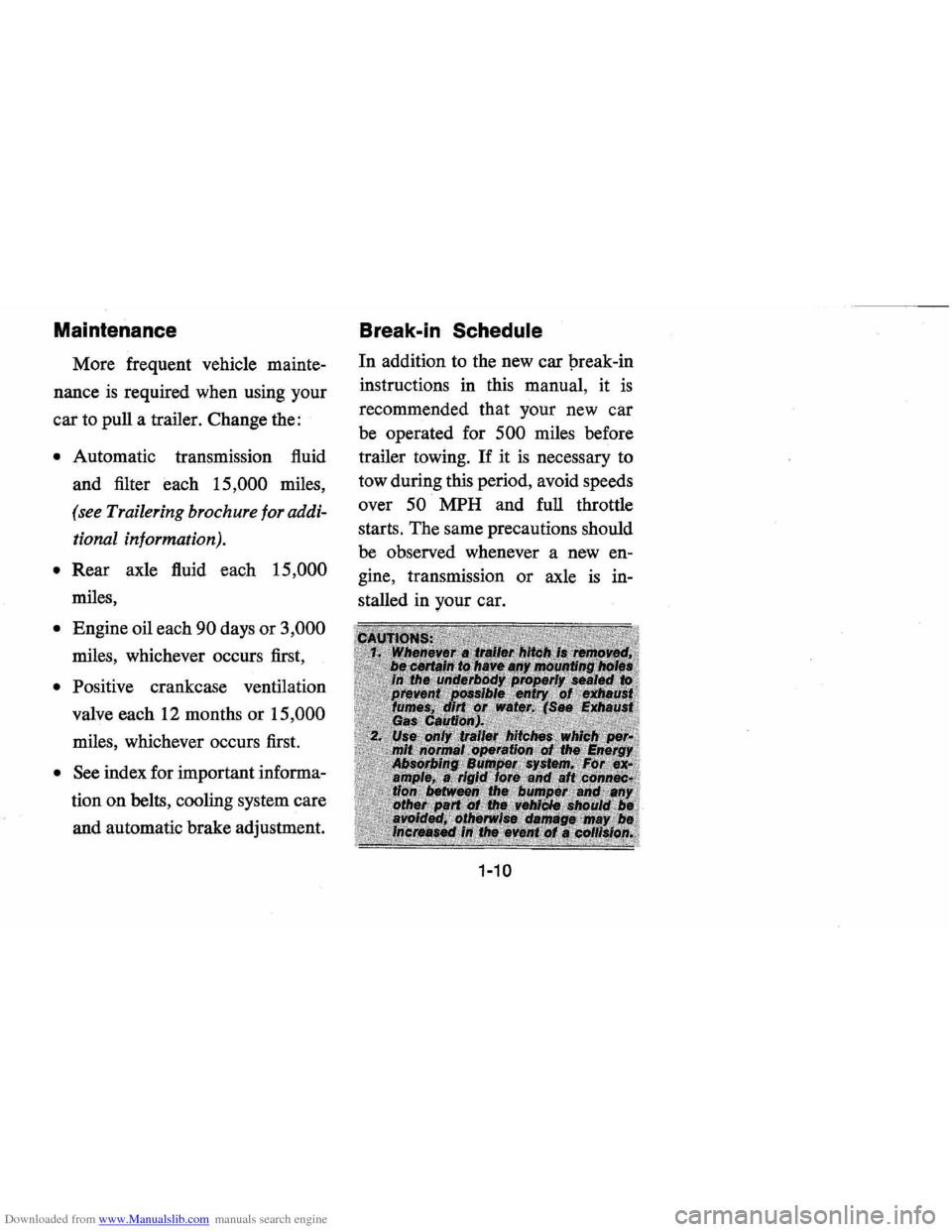
Downloaded from www.Manualslib.com manuals search engine Maintenance
More frequent vehicle mainte
nance
is required when using your
car to pull a trailer. Change the:
• Automatic transmission fluid
and filter each
15,000 miles,
(see Trailering brochure for addi
tional information).
• Rear axle fluid each 15,000
miles,
• Engine oil each 90 days or 3,000
miles, whichever occurs first,
• Positive crankcase ventilation
valve each
12 months or 15,000
miles, whichever occurs first.
• See index for important informa
tion on belts, cooling system care
and automatic brake adjustment.
Break-in Schedule
In addition to the new car preak-in
instructions in this manual, it is
recommended that your new car
be operated for
500 miles before
trailer towing.
If it is necessary to
tow during this period, avoid speeds
over
50 MPH and full throttle
starts. The same precautions should
be observed whenever a new en
gine, transmission or axle
is in
stalled in your car.
1-10
Page 16 of 87
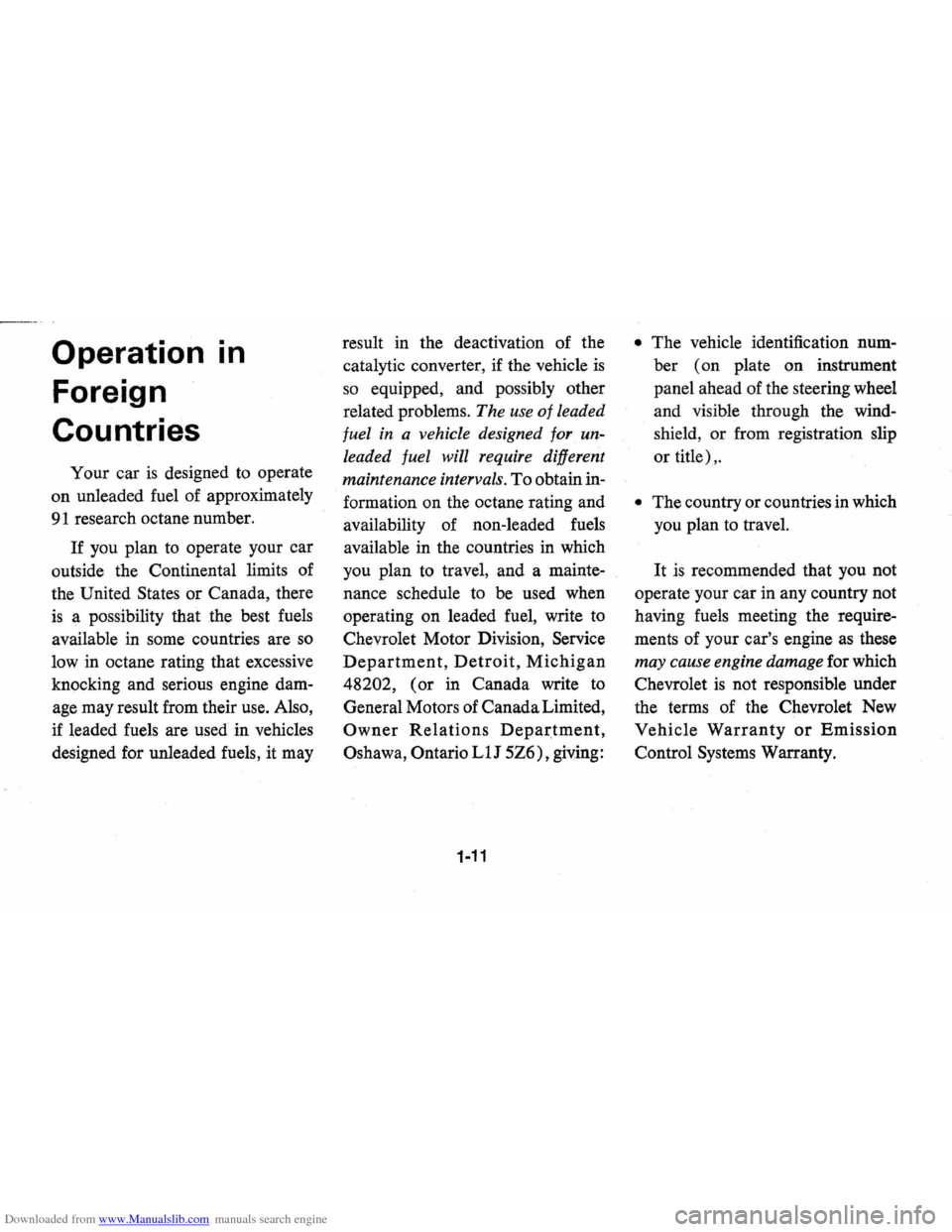
Downloaded from www.Manualslib.com manuals search engine Operation Foreign Countries • In
Your car is designed to operate
on unleaded fuel of approximately
91 research octane number.
If you plan to operate your car
outside the Continental limits of
the United
States or Canada, there
is a possibility that the best fuels
available in some countries are so
low in octane rating that excessive
knocking and serious engine
dam
age may result from their use. Also ,
if leaded fuels are used in vehicles
designed for unleaded fuels, it may result
in the deactivation of the
catalytic converter, if the vehicle
is
so equipped, and possibly other
related problems.
The use of leaded
fuel in a vehicle designed
for un
leaded fuel will require different
maintenance intervals.
To obtain in
formation on the octane rating and
availability of non-leaded fuels
available in the countries in which
you plan to travel, and a mainte
nance schedule to be used when
operating on leaded fuel, write to
Chevrolet Motor Division,
Service
Department, Detroit, Michigan
48202, (or in Canada write to
General Motors of Canada Limited,
Owner Relations Department,
Oshawa, Ontario LlJ 5Z6), giving:
1-11
• The vehicle identification num
ber (on plate on instrument
panel ahead of the steering wheel
and visible through the wind
shield,
or from registration slip
or title),.
• The country or countries in which
you plan to travel.
It is recommended that you not
operate your car in any country not
having fuels meeting the require
ments of your car's engine
as these
may cause engine damage for which
Chevrolet
is not responsible under
the terms of the Chevrolet New
Vehicle Warranty or Emission
Control Systems Warranty.
Page 17 of 87
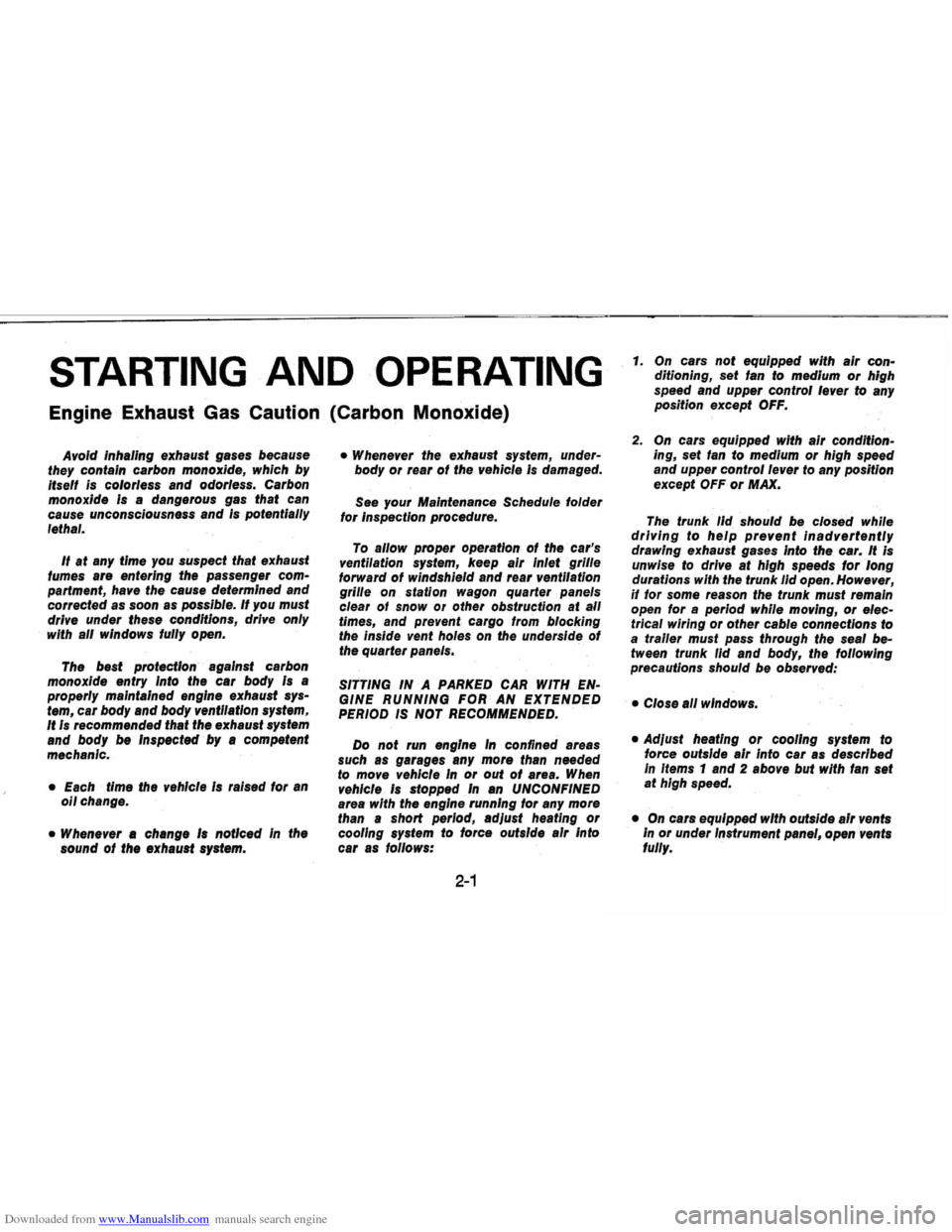
Downloaded from www.Manualslib.com manuals search engine STARTING AND OPERATING
Engine Exhaust Gas Caution (Carbon Monoxide)
AvoId Inhaling exhaust gases because
they contaIn carbon monoxide, which by
Itselt is colorless and odorless. Carbon
monoxide Is a dangerous gas that can
cause unconsciousness and is potentially
lethal.
If at any time you suspect that exhaust
fumes are entering the passenger compartment, have the cause determined and
corrected as soon as possible. If you must
drIve under these conditions, drive only
with
all windows fully open.
The best protection agaInst carbon
monoxide entry Into the car body Is a
properly maIntaIned engine exhaust system, car body and body ventilatIon system, It Is recommended that the exhaust system
and body be Inspected by a competent
mechanIc.
• Each time the vehIcle Is raised for an 011 change.
• Whenever 8 change Is noticed In the
sound Of the exhaust system.
• Whenever the exhaust system, underbody or rear of the vehicle Is damaged.
See your MaIntenance Schedule folder
for inspection procedure.
To allow proper operation of the car's
ventilation system, keep aIr Inlet grille
forward of windshield and rear ventilation
grille on station wagon quarter. panels
clear ot snow or other
obstruction at all times, and prevent cargo from blocking
the inside vent holes on the underside of the quarter panels.
SITTING IN A PARKED CAR WITH ENGINE RUNNING FOR AN EXTENDED PERIOD IS NOT RECOMMENDED.
Do not run engine In confined areas
such as garages any more than needed
to move vehIcle In
or out of area. When vehIcle Is stopped In an UNCONFINED area with the engine runnIng for any more
than a short perIod, adjust heating or cooling system to force outsIde aIr into
car as follows:
2-1
1. On cars not equipped with air conditioning, set fan to medium or high
speed and upper control lever to any
position except OFF.
2. On cars equipped with air conditIoning, set fan to medium or high speed
and upper control lever to any position
except
OFF or MAX.
The trunk lid should be closed while drIving to help prevent inadvertently drawing exhaust gases into the car. It is
unwise to drIve at high speeds for long
durations with the trunk lid open. However, it tor some reason the trunk must remain
open for a period while moving, or electrical wiring or other cable connections to
a trailer must pass through the seal be
tween trunk
lid and body, the following
precautions should be observed:
• Close all windows.
• Adjust heating or cooling system to
force outsIde air into car as described In Items 1 and 2 above but with fan set
at hIgh speed.
• On cars equIpped with outside aIr vents In or under Instrument panel, open vents
fully.
Page 59 of 87
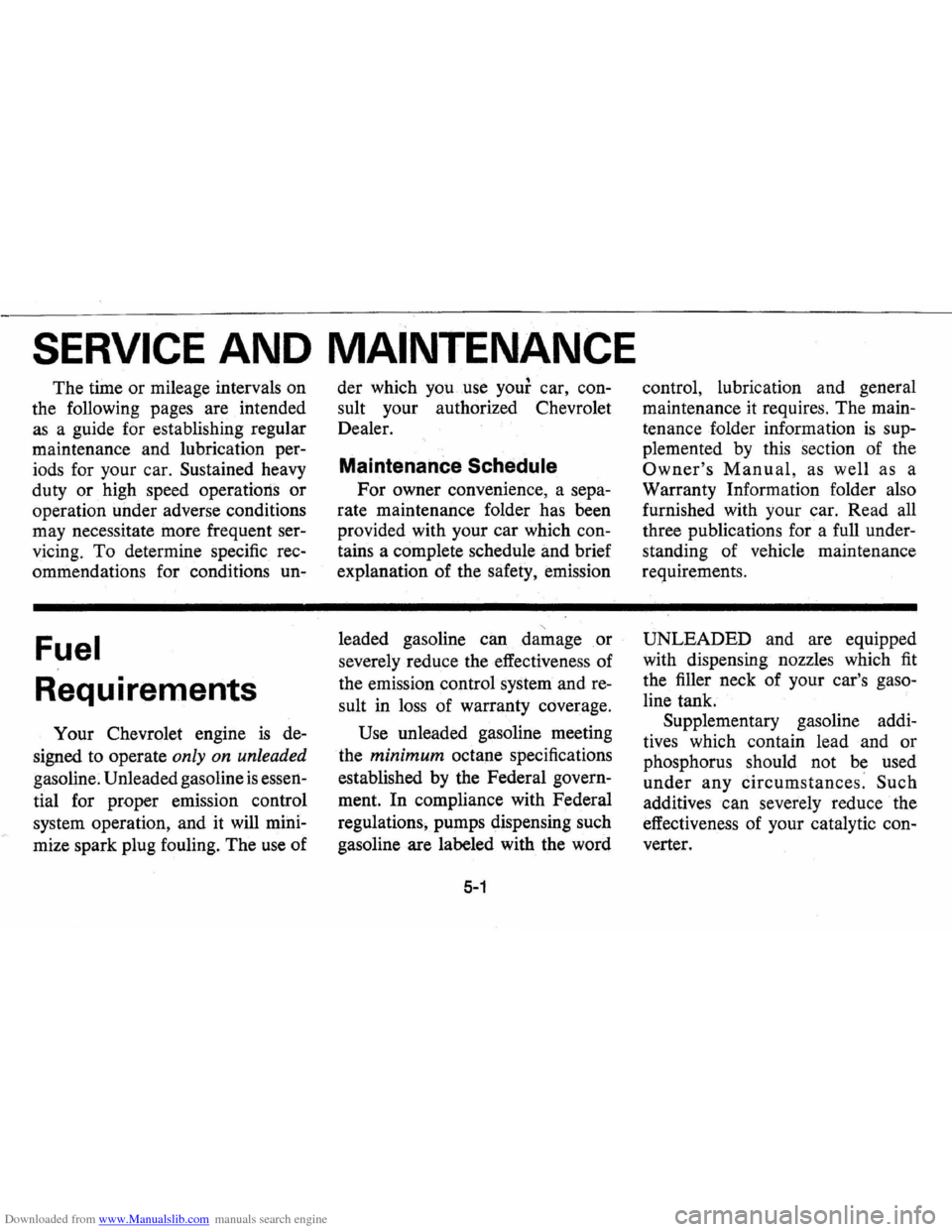
Downloaded from www.Manualslib.com manuals search engine SERVICE AND MAINTENANCE
The time or mileage intervals on
the following pages are intended
as a guide for establishing regular
maintenance and lubrication per
iods for your car. Sustained heavy
duty or high speed operations
or
operation under adverse conditions
may necessitate more frequent ser
vicing .
To determine specific rec
ommendations for conditions un-
Fuel
Requirements
Your Chevrolet engine is de
signed to operate only on unleaded
gasoline. Unleaded gasoline
is essen
tial for proper emission control
system operation, and it will mini
mize spark plug fouling. The
use of der
which you
.use your car, con
sult your authorized Chevrolet
Dealer.
Maintenance Schedule
For owner convenience, a sepa
rate maintenance folder has been
provided with your car which con
tains a complete schedule
and brief
explanation of the safety , emission
"-leaded gasoline can damage or
severely reduce the effectiveness of
the emission control system and
re
sult in loss of warranty coverage.
Use unleaded gasoline meeting
the minimum octane specifications
established
by the Federal govern
ment. In compliance with Federal
regulations, pumps dispensing such
gasoline are labeled with the word
5-1
control, lubrication and general
maintenance it requires. The main
tenance folder information
is sup
plemented
by this section of the
Owner's Manual, as well as a
Warranty Information folder also
furnished with your car. Read all
three publications for a full under
standing of vehicle maintenance
requirements.
UNLEADED and are equipped
with dispensing nozzles which
fit
the filler neck of your car's gaso
line tank.
Supplementary gasoline addi
tives which contain lead and or
phosphorus should not
be used
under any circumstances: Such
additives can severely reduce the
effectiveness of your catalytic con
verter.
Page 69 of 87
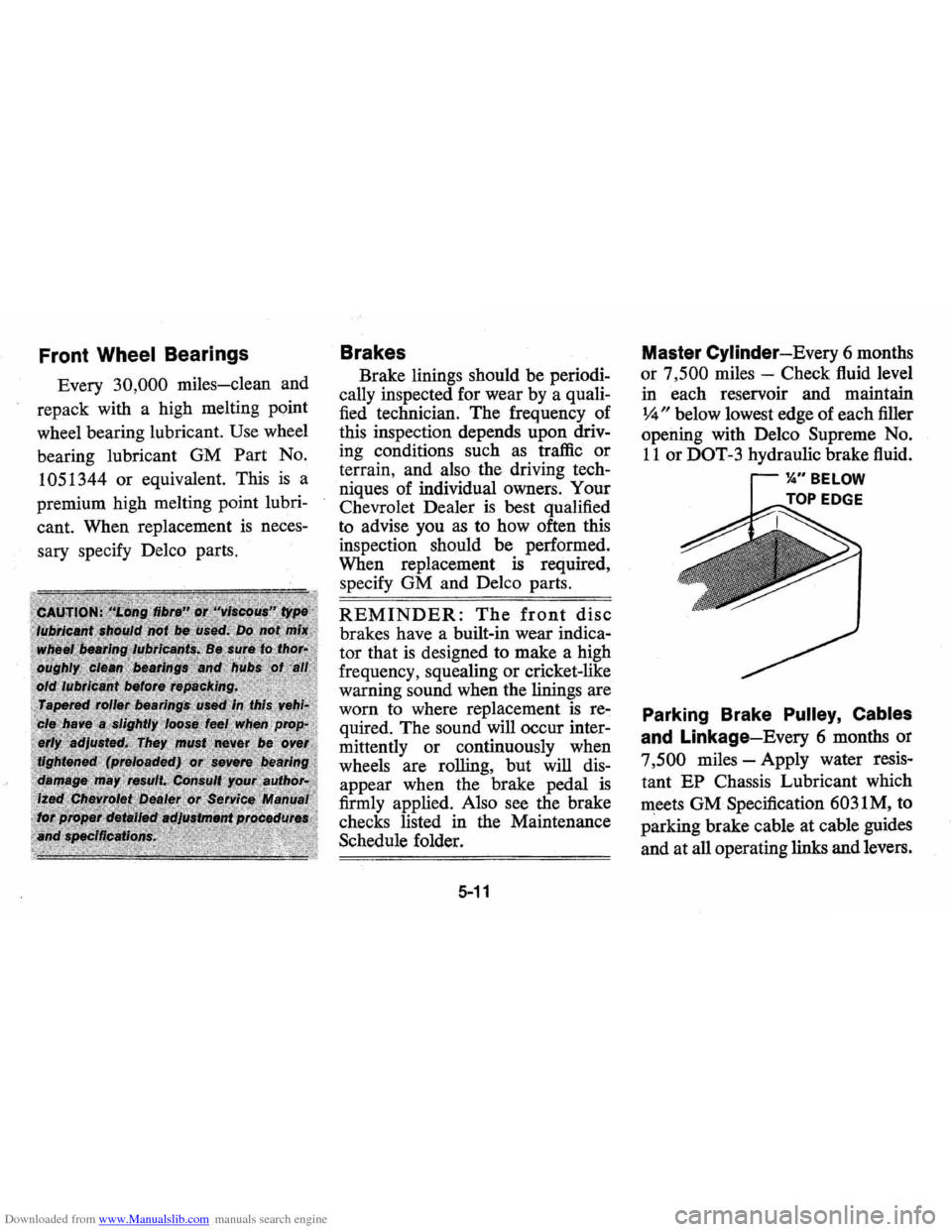
Downloaded from www.Manualslib.com manuals search engine Front Wheel Bearings
Every 30,000 miles-clean and
repack with a high melting point
wheel bearing lubricant.
Use wheel
bearing lubricant GM
Part No.
1051344 or equivalent. This
is a
premium high melting point lubri
cant. When replacement
is neces
sary specify Delco parts.
Brakes
Brake linings should be periodi
cally inspected for wear by a quali
fied technician. The frequency of
this inspection depends upon driv
ing conditions such
as traffic or
terrain, and also· the driving tech
niques of individual owners. Your
Chevrolet Dealer
is best qualified
to advise you as to how often this
inspection should be performed.
When replacement
is required,
specify GM and Delco parts.
REMINDER: The front disc
brakes have a built-in wear indica
tor that
is designed to make a high
frequency, squealing or cricket-like
warning sound when the linings are
worn to where replacement
is re
quired. The sound will occur inter
mittently or continuously when
wheels are rolling, but will dis
appear when the brake pedal
is
firmly applied. Also see the brake
checks listed in the Maintenance
Schedule folder.
5-11
Master Cylinder-Every 6 months
or
7,500 miles -Check fluid level
in each reservoir and maintain
~ /I below lowest edge of e.ach filler
opening with Delco
Supreme No.
11 or DOT -3 hydraulic brake fluid.
~" BELOW
TOP EDGE
Parking Brake Pulley, Cables
and Linkage-Every 6 months or
7
,500 miles -Apply water resis
tant EP Chassis Lubricant which
meets GM Specification
6031M, to
parking brake cable at cable guides
and at all operating links and levers.
Page 79 of 87
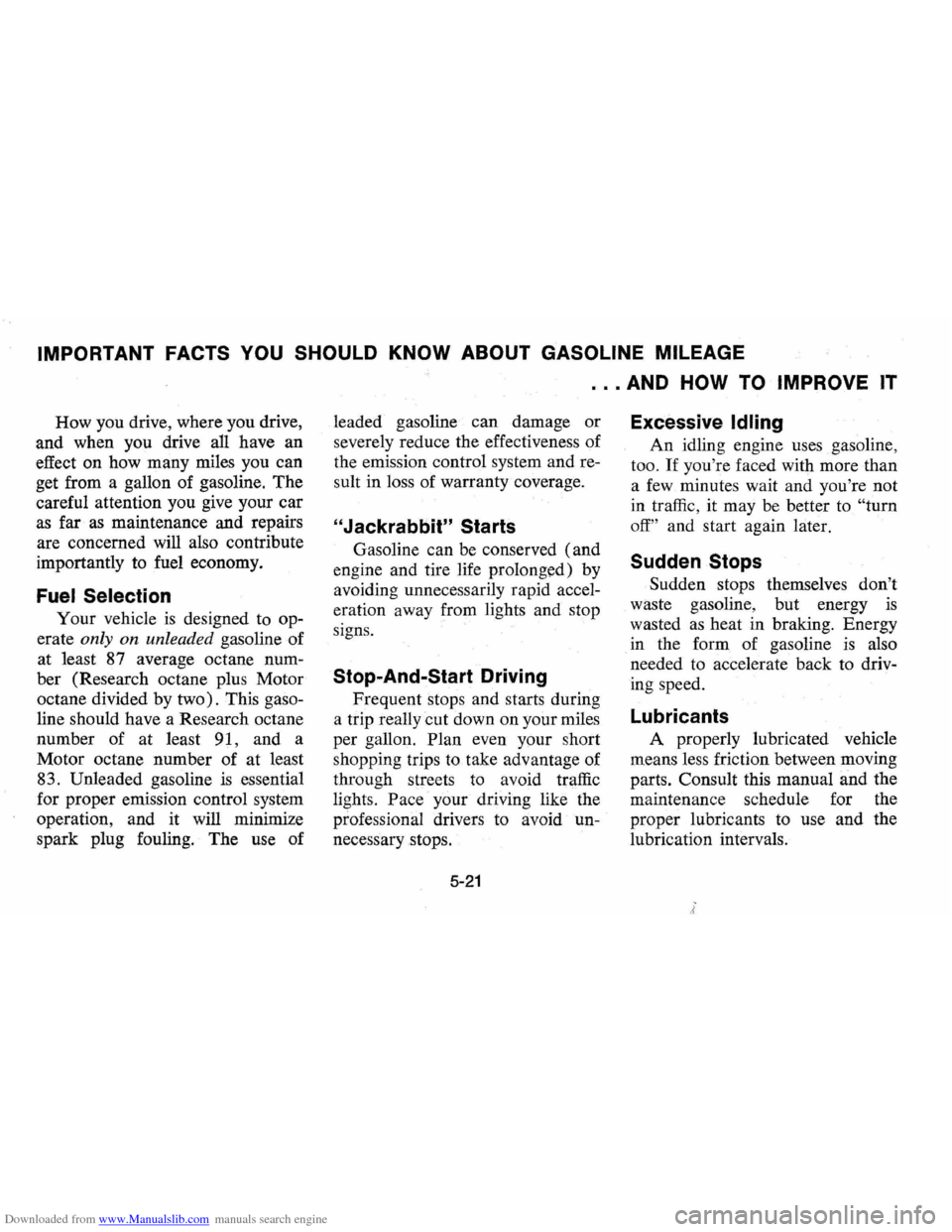
Downloaded from www.Manualslib.com manuals search engine IMPORTANT FACTS YOU SHOULD KNOW ABOUT GASOLINE MILEAGE
How you drive, where you drive,
and when you drive all have an
effect on how many miles you can
get from a gallon of gasoline. The
careful attention you give your car
as far as maintenance and repairs
are concerned will also contribute
importantly to fuel economy.
Fuel Selection
Your vehicle is designed to op
erate
only on unleaded gasoline of
at least 87 average octane num
ber (Research octane plus Motor
octane divided by two). This gaso
line should have a Research octane
number of at least 91, and a
Motor octane number of
at least
83. Unleaded gasoline
is essential
for proper emission control system
operation, and it will minimize
spark plug fouling. The use of
... AND HOW TO IMPROVE IT
leaded gasoline can damage or
severely reduce the effectiveness of
the emission control system and re
sult in loss of warranty coverage.
"Jackrabbit" Starts
Gasoline can be conserved (and
engine and tire life prolonged) by
avoiding unnecessarily rapid accel
eration away from lights and stop
signs.
Stop-And-Start Driving
Frequent stops and starts during
a trip really cut down on your miles
per gallon.
Plan even your short
shopping trips to take advantage of
through streets to avoid traffic
lights.
Pace your driving like the
professional drivers to avoid
un
necessary stops.
5-21
Excessive Idling
An idling engine uses gasoline,
too.
If you're faced with more than
a
few minutes wait and you're not
in traffic, it may be better to
"turn
off"
and start again later.
Sudden Stops
Sudden stops themselves don't
waste gasoline , but energy
is
wasted as heat in braking . Energy
in the form of gasoline
is also
needed to accelerate back to driv
ing speed.
Lubricants
A properly lubricated vehicle
means less friction between moving
parts. Consult this manual and the
maintenance schedule for the
proper lubricants to use and the
lubrication intervals.